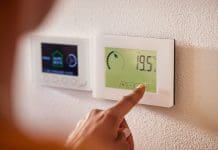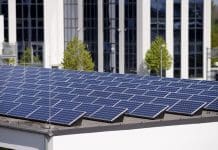Hubert Da Costa, VP EMEA at Cradlepoint shares insight into the role of smart workplaces and its place in the commercial sector
With more than 5.87 million connected utility meters in buildings across the UK, the government’s plan to have widespread smart meters coverage by 2020 seems to be working. The Internet of Things (IoT) has opened a world of new possibilities. By connecting devices to wireless networks, everything from coffee machines to street lamps can become more efficient.
The Smart Era
Generally defined as devices that connect to the Internet, smart devices enable a greater level of control and a more in-depth method of data collection than ever before.
As people, places and things are becoming connected all around us, smart technology has an important role to play in both new and existing office buildings. It can provide a variety of functions: from reporting faulty infrastructure, to recording energy usage. Fast mobile Internet connections are the backbone of this new IoT landscape. While 4G is already supporting IoT development in office buildings, 5G will be the catalyst for even greater adoption. This efficiency can generate a smarter business world, and the pace of development is only going to continue to increase.
Smart Utilities
Smart meters provide real-time information on heating, electric and water usage. Installing them offers tremendous management benefits. Office building managers no longer need to rely on estimated bills and therefore only pay for what is being used. There is no need for anyone to visit the site to take physical readings as information can be sent directly to the energy supplier. Real-time displays show usage over time and data can be fed over the Internet to managers operating remotely. The increased visibility and access to data also means building managers can switch energy providers more quickly to select the most competitive tariff. Office building managers can also use smart meters to gain a competitive advantage. By providing the most energy efficient and low carbon office facilities, office building managers can make their buildings more attractive to perspective tenants.
Smart Lighting
Gartner claims that smart lighting can reduce energy consumption by 90%. By installing smart bulbs in office buildings, office building managers can ensure offices are only lit when occupied. Smart bulbs also learn when occupants are usually in or out to create a custom lighting framework for each office. Even when programmed, smart bulbs can also switch on if there is a change in the pattern.
Office building managers remotely managing lighting in office buildings can provide improved working conditions and security for the businesses occupying the premises. Like smart metering, this creates a better commercial offering and gives office building managers a competitive advantage to attract new businesses.
Smart Heating
As with lighting and heating, data from smart thermostats can be accessed with ease from remote locations through a web-enabled system, offering a greater level of control and visibility for managers of office buildings. Smart thermostats can constantly monitor energy usage in office buildings and significantly reduce unnecessary power consumption. Smart heating controls company Tado claims by using a smart heating control, heating costs can be reduced by 31%.
When remotely controlled, smart thermostats can switch on the heating when an office is unoccupied, reducing the risk of pipes freezing and bursting. This also offers further advantages for maintenance. Connected equipment can carry out preventative maintenance, checking itself for faults and sending data directly to the office building managers or energy supplier. The issues can then either be solved remotely, or engineers can be sent to investigate.
Smart Timing
While integrating smart meters into office buildings provides a host of benefits – from increased control, visibility and energy efficiency – office building managers who act now can gain additional benefits as early adopters. Some energy suppliers may offer to install smart meters free of charge, or fold the cost of the roll out into an existing energy bill in a similar way to the installation and maintenance of traditional meters.
Maximising efficiency and minimising energy costs is crucial for businesses that want to be competitive in the global commercial environment. Gaining access to accurate, up-to-date information on energy use in a cost-effective way, whilst simultaneously providing tenants with a modern and Internet-connected working environment, should be a key priority for office building managers over the next few years.
Hubert Da Costa
VP EMEA
Cradlepoint













